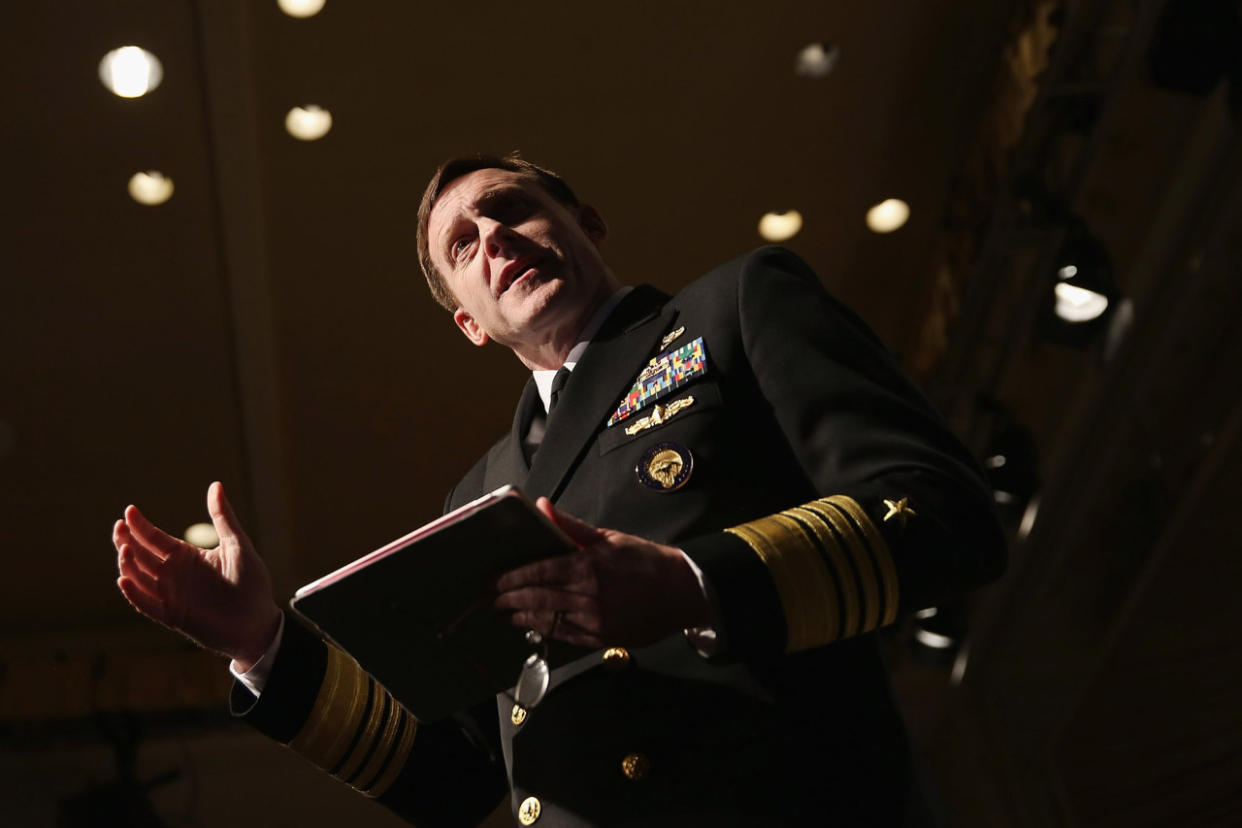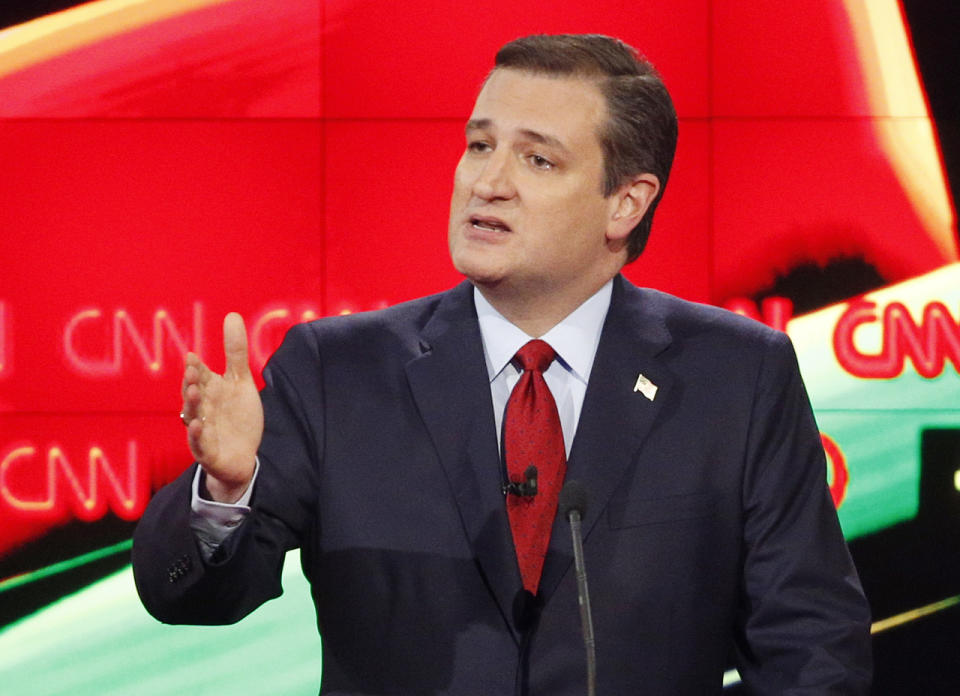NSA director says new phone records law is “working well so far”

National Security Agency Director and U.S. Cyber Command Commander Adm. Michael Rogers addresses the Armed Forces Communications and Electronics Association’s sixth annual Cybersecurity Technology Summit. (Photo: Chip Somodevilla/Getty Images)
In his first public comments since Congress ended the NSA’s bulk collection of Americans’ phone records, the agency’s director said a new program imposed by Congress to replace it is “working well so far” but that he needs more “empirical data” before he can determine whether it will impair the country’s ability to thwart future terror attacks.
The comments Tuesday night by NSA Director Adm. Michael Rogers would seem to contradict — in some respects — the complaints by critics, led by Republican presidential candidate Marco Rubio, that a new law known as the USA Freedom Act has compromised the intelligence community’s ability to access the phone records of terror suspects.
The impact of the USA Freedom Act was front and center during Tuesday night’s GOP debate, with Rubio blasting rival Sen. Ted Cruz for voting in favor of the law. The bill, he charged, “did … take away a valuable tool that allowed the National Security Agency, and other intelligence agencies, to quickly and rapidly access phone records and match them up with other phone records, to see who terrorists have been calling.” Rubio added, “I promise you, the next time there is an attack on this country, the first thing people are going to want to know is, why didn’t we know about it and why didn’t we stop it?”
Speaking at virtually the same time before an industry group, Rogers offered a more measured, if equivocal, assessment of the law’s impact. He said that the NSA was working closely with U.S. phone companies to implement the USA Freedom Act — and suggested that there is no evidence to date that it has jeopardized national security.
SLIDESHOW: The 5th GOP debate >>>
Under the new law, which was prompted by the disclosures of Edward Snowden, the NSA can no longer indiscriminately collect domestic phone records in order to maintain a massive database for use in terror investigations. Instead, phone companies are required to maintain the records — and the agency can only access them on an individual basis with a warrant when it needs them for an ongoing probe.
“It’s working well so far,” Rogers said of the USA Freedom Act, which went into effect just days before the San Bernardino terror attack. But he quickly added that the law posed “a not insignificant challenge” for the phone companies. And Rogers suggested that the jury was still out on how quickly the agency will be able to access records they need in fast-developing investigations.
“They’re working hard to try to make this work,” said Rogers about the phone companies. “Each of them has a slightly different policy as to how long they retain” their records, “and a slightly different process as to how they provide it” to the NSA.
“The biggest thing we have to access over time — and I promise the Congress I would do this — is we need to get a sense for timeliness. What is the implication of this new structure in terms of our ability to generate timely information? We need to get real empirical data.”
The disclosure by Snowden of the phone call record program created a huge public backlash over concerns that the NSA was secretly collecting huge volumes of personal information about American citizens without any indication they were implicated in terrorist activity.
Rogers, a Navy cryptologist who was appointed to head the NSA in the aftermath of the Snowden revelations, spoke about the NSA program in a rare public appearance at a dinner sponsored by the Intelligence and National Security Alliance, an industry group funded by leading intelligence community contractors. He defended the original purpose of the phone collection program, insisting it grew out of gaps identified in the aftermath of the 9/11 terror attacks in order to identify terror suspects inside the country.
“One of the hijackers,” he said, “was making phone calls back to Yemen. We did not see the call originating from the United States.”
Rogers’ account omitted one of the major findings of the 9/11 Commission: that the hijacker in question, Khalid Al-Mihdhar, was actually known by the CIA to be inside the U.S., but that the intelligence agency never passed this information along to the FBI.
Still, Rogers said, the NSA call collection program was created for a “conscious reason” — and not to spy on American citizens. “You can certainly disagree with the program,” he offered, while still understanding that the NSA had a purpose in creating it.
While some of Rogers’ comments may offer comfort for Cruz in his clash with Rubio over the issue, other remarks by the NSA director Tuesday night seem to undercut a portion of the Texas senator’s defense of the USA Freedom Act.
Cruz asserted during Tuesday’s debate that the new law had actually expanded the NSA’s ability to collect phone records, saying the bulk collection had only covered landlines, accounting for 20 to 30 percent of American phone calls. The new law, he insisted, would cover “100 percent” of all phone calls.
“It gave us greater tools, and we are seeing those tools work right now in San Bernardino,” Cruz said about the USA Freedom Act. “The prior program only covered a relatively narrow slice of phone calls. When you had a terrorist, you could only search a relatively narrow slice of numbers, primarily landlines. The USA Freedom Act expands that, so now we have cellphones, now we have Internet phones, now we have the phones that terrorists are likely to use — and the focus of law enforcement is on targeting the bad guys.”
But Rogers indicated that expanded ability to collect records of cellphone and Internet calls from smaller phone companies (who were not covered by the bulk collection program) is still a long way off. At the moment, he said, the NSA is working with the major phone companies that it previously used for bulk collection to “refine” methods to retrieve their records under the new system.
“Three weeks into the process, we’re working with the initial set of providers,” Rogers said. “We’ll continue to finish the refining of the process with them. And then we will look at additional providers over time.”

Ted Cruz makes a point during the CNN Republican presidential debate in Las Vegas Tuesday. (Photo: John Locher/AP)

